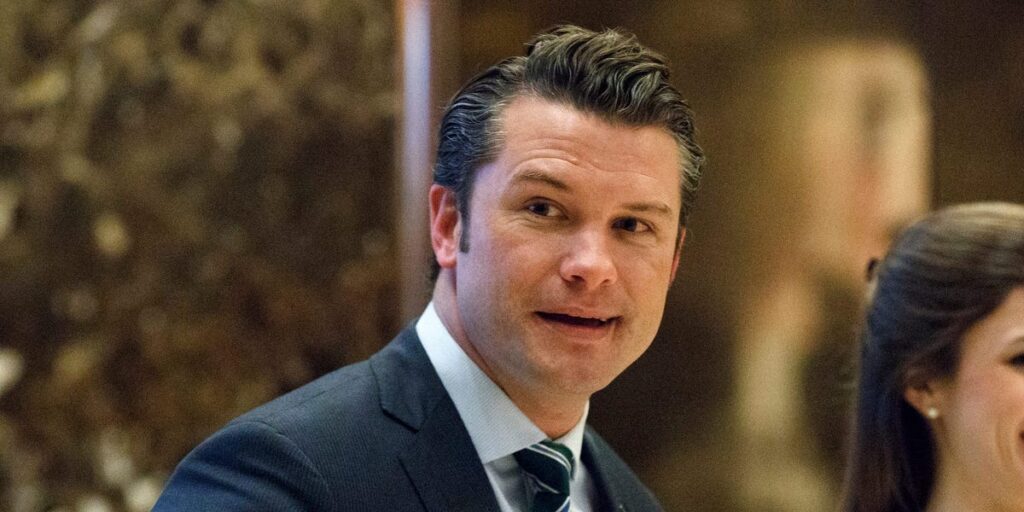- Donald Trump has chosen Pete Hegseth as his defense secretary at a key point in the war in Ukraine.
- The military veteran and Fox News commentator has mostly aligned with Trump on Ukraine.
- On a podcast last week, he said he didn’t want US intervention to force Putin’s hand.
President-elect Donald Trump announced Pete Hegseth, a military veteran and Fox News host, as his pick for defense secretary on Tuesday — in a move that came as a surprise to many onlookers.
The choice of Hegseth raised questions about the US’ approach to the war in Ukraine under a second Trump administration.
In an episode of the “Shawn Ryan Show” podcast last week, recorded before Trump’s announcement, Hegseth said he didn’t think Russian President Vladimir Putin would go further than Ukraine and attack countries like Poland.
He also said that he didn’t want US intervention to push Putin too far and consider nuclear weapons.
“I don’t want American intervention driving deep into Europe and making him feel like he’s so much on his heels that he does have to — because early on, he was talking about nukes,” Hegseth said.
He added that the US had “burned two decades of money” in Afghanistan and Iraq, and that it was “tempted to do it again” in Ukraine.
Hegseth on Ukraine
Hegseth has long mirrored some of Trump’s key positions on foreign policy and Ukraine.
Back in 2022, Hegseth defended remarks Trump had made just before Putin’s full-scale invasion of Ukraine. Trump had called Putin’s recognition of the independence of the Ukrainian breakaway republics of Donetsk and Luhansk “genius” and “wonderful.”
Trump’s comments shocked onlookers at the time. But Hegseth argued on “Jesse Watters Primetime” that Trump was merely trying to “troll” the US media that had made Putin into a strawman.
Putin invaded Ukraine two days later.
Speaking on Fox News in March 2022, Hegseth also criticized both Putin as a “war criminal” and the administration of President Joe Biden for not equipping Ukraine fast enough.
Notably, he said that Putin sees any cease-fire as “an opportunity to reload.”
“What’s at stake is repelling an authoritarian who basically is saying ‘I want the Soviet Union back, I want Ukraine back, I want Kyiv back,'” he said.
Critical of NATO
Hegseth has also been critical of the US’ NATO allies, saying in the same Fox interview that the US should step up if Putin’s aggression spread to Eastern Europe, but that as the most exposed countries they should be taking the lead.
However, Hegseth’s rhetoric on NATO has steadily sharpened in recent years, with him calling the US’ allies “outdated, outgunned, invaded, and impotent” in his book “The War on Warriors: Behind the Betrayal of the Men Who Keep Us Free,” according to Reuters.
Trump has long been vocal about NATO countries not meeting their target of 2% of GDP spent on their militaries, even going so far as to say that he’d encourage other countries to invade those that don’t meet it.
A diminished role?
Even so, military analysts who talked to BI said they don’t expect Hegseth to play a major decision-making role in policy toward Ukraine, or in any decision to scale back aid.
In office, Hegseth would join a group of senior Trump officials with influence over the direction of the war, though Trump would have the final say. His national security advisor, Michael Waltz, and vice president, JD Vance would also likely be significant voices, as would Trump’s choice for Secretary of State, which several outlets reported is likely to be Senator Marco Rubio.
Vance has previously criticized US support for Ukraine, and said: “I don’t really care what happens to Ukraine one way or another.”
Alexander Libman, a professor of Russian and East European politics at the Free University of Berlin, said that “Trump is selecting members of his administration primarily based on their personal loyalty.”
This means that their own opinions “may not matter that much — it will be up to what Trump wants them to do,” he added.
Libman said he expects Trump to invest considerable efforts to stop the war early on, and his cabinet members to fall in line.
Anton Barbashin, the cofounder and editorial director at Riddle Russia, an online journal on Russian affairs, told BI that he doesn’t expect Defense Secretary Hegseth to cut support for Ukraine, with any peace deal between Putin and Trump unlikely in the short term.
Instead, he said the US may actually ramp up aid to Ukraine if peace talks fail.
“So far, the signals are moderately opportunistic — Trump is nominating hawkish folks, so Kyiv may count on increased support,” he said.



